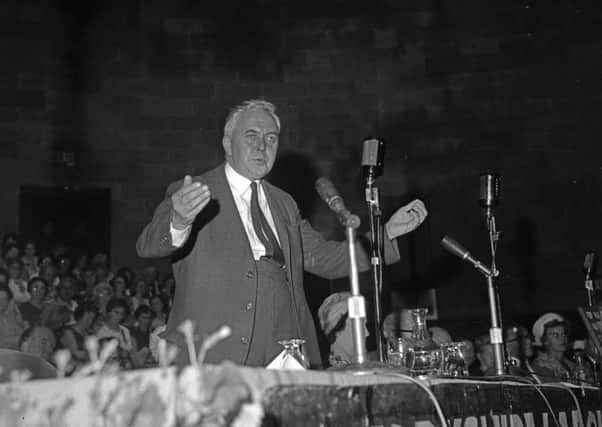Jayne Dowle: The tragic loss of Harold Wilson's legacy of opportunity


TOMORROW is the centenary of the birth of Harold Wilson. He was born in the middle of the First World War in the village of Milnsbridge, near Huddersfield, and went to become the most powerful man in the country.
Imagine a boy – or a girl – coming into the world today in an unassuming terrace house in the North of England and growing up to become Prime Minister. It’s almost impossible, to either believe or achieve.
Advertisement
Hide AdAdvertisement
Hide AdThis isn’t what Wilson would have wanted. It is fair to say that he had a genuine desire to raise the aspirations of ordinary boys and girls, and level the playing field of opportunity. To this end, he oversaw the widespread introduction of comprehensive schools, brought in polytechnic colleges and engineered the birth of the Open University, which gave thousands of people a chance of the higher education previously beyond their reach. By 1981, 45,000 students had received degrees through this route.
Wilson had experienced at first-hand the transformative power of education. The son of an industrial chemist and a former schoolteacher, he attended grammar school in Huddersfield (and later on the Wirral where his father moved for work) and won an exhibition to Jesus College, Oxford. His chosen subject was history, but he swapped to PPE (politics, philosophy and economics) after his first year. Popular myth holds that he achieved the highest marks hitherto on his papers.
It was but a short step across the quad to becoming a don, until the Second World War saw him seconded to become a high-ranking civil servant. Working alongside Sir William Beveridge, the war sharpened his political instincts. He entered Parliament by a landslide in 1946 for the seat of Ormskirk. Quite a journey for a lad from Warneford Road.
At university, it’s reported that he eschewed the Labour party in favour of the Liberals because he had no patience with left-leaning upper-class intellectuals pontificating about working class struggle. He was a thinker first and foremost, but his politics were pragmatic. As the 1960s dawned, the generation of “baby boomers” born immediately after the war were leaving school. Many of these had benefitted from better investment in education overall following the 1944 Education Act.
Advertisement
Hide AdAdvertisement
Hide AdAnd the times were changing; the global mood was towards equality and participation. The population needed more places in higher education. Harold Wilson was able to provide these, propelled forward not only by his Labour principles, but a growing recognition that Britain needed a better-educated population to benefit from the “white heat of technology” he spoke so fervently about.
The great irony of course is that Wilson himself represents a very traditional path of advancement: bright boy from modest home, Oxbridge glory via grammar school. His answer to the clamour, however, was to establish 30 polytechnics to provide degree courses with a vocational slant. His native North was a huge beneficiary, with new polytechnics opening in Huddersfield, Sheffield and Leeds to name just a few.
The number of students in higher education doubled and women flocked to study at the polytechnics and also to the newly-funded local colleges of further education; a popular choice was teacher-training. I know women who set off from Barnsley as teenagers with not much more than their A levels and a toothbrush, who graduated to educate my own generation with passion and commitment.
Compare that to the desperate campaigns to persuade young people today to undertake teacher training and you see again how times have changed.
Advertisement
Hide AdAdvertisement
Hide AdChoice. Expansion. Opportunity. How different from our own world of higher education, where now it’s all about contraction, cost and the relentless drive to squeeze value for money out of a system creaking at the seams due to lack of government investment.
What would Lord Wilson think if he could see the clock whizzing back to a time when only those who went to the most-expensive fee-paying schools get the chance to make a difference to the world? What would he make of today’s Government ministers, overwhelmingly educated privately, making decisions which affect millions without such privileges?
His legacy then is a bitter-sweet one. He helped to open up the doors of higher education. Yet, his achievement set the bar so high that in the cold, harsh light of the 21st century, we feel mostly disappointment and frustration that our hopes were ever raised. It would be fitting if this week, our own politicians took a moment to recognise this.
Tomorrow: Reflections and anecdotes by Huddersfield MP Barry Sheerman.